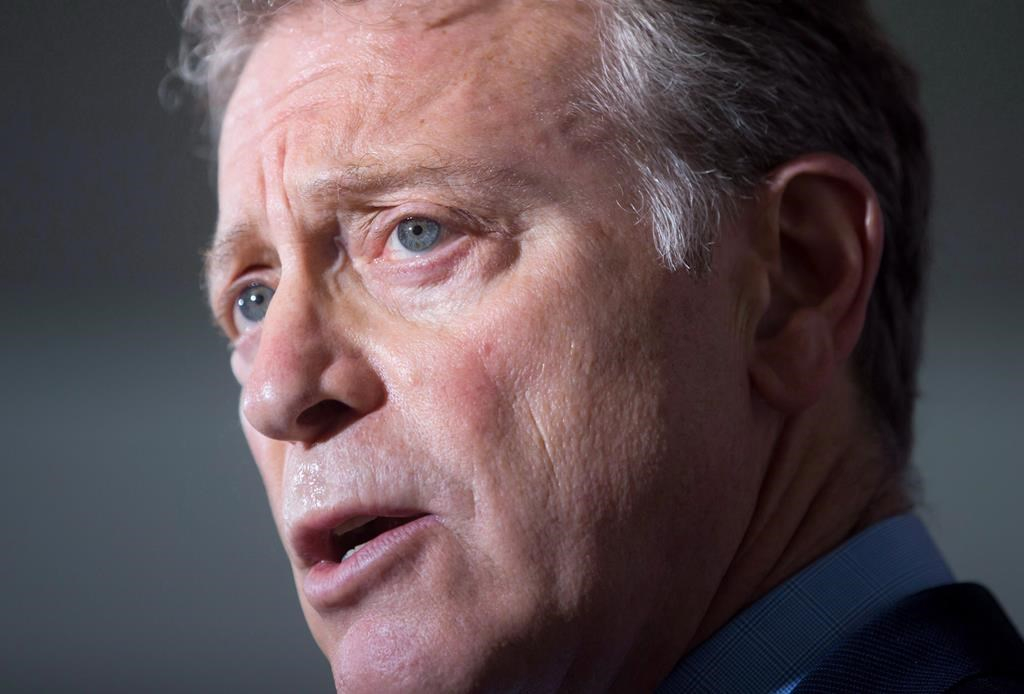Support strong Canadian climate journalism for 2025
The B.C. government has introduced new oil spill regulations that include restrictions on transportation until "the behaviour of spilled bitumen can be better understood."
The measures announced Tuesday could complicate Texas-based energy giant Kinder Morgan's plan to expand its Trans Mountain oil pipeline from Alberta to the B.C. coast.
"We're proposing to introduce regulations through the Environmental Management Act on a number of aspects of spill control," George Heyman, minister of environment and climate change strategy, told National Observer. "Part of that is to restrict any increase in diluted bitumen transportation by rail or pipeline until we can be certain that there is an ability by [companies] to adequately mitigate the spills."
Heyman said the government would announce a scientific advisory panel to make recommendations about how heavy oil could be safely transported and cleaned up in the event of a spill.
He said the panel would work with the B.C. government to determine how much oil is currently being transported, and how it should be restricted for the time being as it researches ways to mitigate and respond to bitumen spills in the future.
"British Columbians expect our government to defend the environment, as well as our coastline, interests, and economy," he said.
The $7.9 billion Trans Mountain project proposal would add 980 kilometres of infrastructure to an existing pipeline system, tripling its capacity to pump 890,000 barrels of oil daily from Alberta to a marine terminal in Burnaby. From the company’s Burnaby site, the oil would be shipped to Asian markets in tankers through Vancouver Harbour and then through the waters of the Juan de Fuca Strait shared by British Columbia and Washington State.
"Kinder Morgan is aware of the Government’s announcement today and will actively participate in their engagement and feedback process," Kinder Morgan Canada senior strategic advisor Ali Hounsell said. "The Expansion Project’s approval by the Government of Canada followed a rigorous and lengthy regulatory process that included a thorough examination of the pipeline and products being shipped and there are conditions on the Project from both the National Energy Board and the BC Environmental Assessment Office related to diluted bitumen."
Supporters of the pipeline expansion, which was approved by Prime Minister Justin Trudeau's government in November 2016, argue that it is needed to create jobs, bring Albertan oil to tidewater, and boost provincial economies that have struggled with slumping oil prices. Opponents of the project include the City of Burnaby and the City of Vancouver, which launched a legal challenge last October with six B.C. First Nations to overturn Trudeau's approval in court.

Notley slams B.C. for ‘political game-playing’
Alberta’s NDP government immediately slammed B.C.’s announcement, describing it as illegal.
“Having run out of tools in the toolbox, the Government of British Columbia is now grasping at straws,” said Alberta Premier Rachel Notley in a statement. “The B.C. government has every right to consult on whatever it pleases with its citizens. It does not have the right to rewrite our Constitution and assume powers for itself that it does not have. If it did, our Confederation would be meaningless. Therefore, the action announced today by the B.C. government can only be seen for what it is: political game-playing.”
Notley also warned that these political maneuvers could have serious consequences for jobs across the country.
“When I talk about investor confidence, I’m not only speaking about oil and gas development. I’m also talking about all cases where investors engage with lawmakers,” she said. “Job creators need to be able to trust lawmakers. Today’s announcement suggests that in B.C. they cannot. British Columbians — indeed all Canadians — deserve better.”

The Canadian Energy Pipeline Association, an industry lobby group that represents pipeline operators, released a statement opposing the new measures announced by B.C.'s government.
"CEPA is extremely concerned about the sudden introduction of restrictions that would halt the increased flow of diluted bitumen through the province until further studies are completed. These restrictions have never been part of the five-year consultation process and come as a surprise to industry," the Calgary-based association said.
"Extensive research has already been conducted into the behaviour of diluted bitumen and the nature of the product is well-understood. Everything – from its properties, to how it’s transported and cleaned up in the case of a spill – has been thoroughly studied and the information is known and available to the government of British Columbia."
Bitumen spill cleanup
Some of the project's detractors, including scientists, have raised questions about how diluted bitumen would be cleaned up in the event of a major spill.
In the U.S., Washington state officials have expressed frustration in memos from January 2017 about the lack of transparency around information — vital for an oil spill response — on the ingredients of the diluent used to help Alberta bitumen flow through Kinder Morgan’s Trans Mountain oil pipeline.
From the company’s Burnaby site, the oil would be shipped to Asian markets in tankers through Vancouver Harbour and then through the waters of the Juan de Fuca Strait shared by British Columbia and Washington State. The pipeline company previously suggested in responses to National Observer that it has been transparent, publishing a list of 52 products that Transport Canada has approved for the pipeline, as well as components listed on crudemonitor.ca for various types of oil.
Trans Mountain has told Canada’s National Energy Board (NEB) it would quickly disclose ingredients in the event of a spill.
"To the best of my knowledge, B.C. still does not have a clear and definitive idea of all the components (in bitumen transported by the Trans Mountain pipeline)," Heyman said. "Washington State has different laws than we do, but part of the purpose of establishing a scientific panel is to look at every aspect of the transportation of diluted bitumen and other crude oil that could affect B.C.'s coastline, land and our interior waterways."
Hounsell responded Kinder Morgan already makes this information public on its website. The page includes information about diluted bitumen and links to crudemonitor.ca.
"It's another roadblock for a project that has faced a lot of uncertainty and a lot of risk," said Jessica Clogg, executive director for West Coast Environmental Law. "There are some significant regulatory barriers that may prevent the pipeline from ever being constructed."
“Today’s announcement is a major blow to Kinder Morgan," said Greenpeace climate and energy campaigner Mike Hudema. "A tanker spill on the ocean, like the Paris-sized spill caused by the Sanchi tanker earlier this month, would be virtually impossible to clean up and the impacts could last decades."
This story was updated at 12:10 a.m. PT with comments from Kinder Morgan and provincial environment minister George Heyman and at 1:53 PT with comments from Alberta Premier Rachel Notley. The story was updated at 4:03 p.m. PT with a comment from the Canadian Energy Pipeline Association.
With files from Mike De Souza






Comments
Notley’s ‘loss of thousands of jbs’ Mantra, familiar to us all, emanates from both Alberta and Ottawa. Jobs in Alberta’s Fossil Fuel Industry represent only 6% of Alberta jobs. Of course it represents a significant number of lost jobs for Oil Sands Workers, but also includes Industry Lobbyists and industry Organizations like CAPP and CEPA . They are not the victims here. They are the recipients of tax payer subsidies, the tiniest of carbon taxes, freedom to leave abandoned wells, massive tailings ponds and a desecrated environment in Alberta while contaminating the Indigenous communities on whose territorial lands they are extracting. They also operate under an increased ‘cap’ on production of the emissions that are putting civilization at risk.
Notley states, ”When I talk about investor confidence, I’m not only speaking about oil and gas development. I’m also talking about all cases where investors engage with lawmakers,” she said. “Job creators need to be able to trust lawmakers.”
And that is where a key problem lies. The Fossil Fuel Industry DOES expect government to keep their promises. Yet government made different promises to us, the citizens. We, the people, “ need to be able to trust lawmakers” to be acting for the public good, not the profits of a dying, and dangerous fossil fuel industry. Notley’s words inadvertently describe the ‘captured state’, so aptly described by Kevin Taft in his deeply researched book, “Oil’s Deep State.: How the petroleum industry undermines democracy and stops action on global warming - in Albert, and in Ottawa”.
Rachel Notley is starting to seriously annoy me. Sure, she's the premier of Alberta, she's supporting the Alberta oil patch right or wrong, I get that. And it's not totally inconsistent for an NDP premier to be backing something for the sake of jobs. She's wrong, but it's understandable. I file it as background "Yeah, Notley has to say that stuff, whatever".
But here she's saying basically that nobody should ever seriously regulate or hamper a corporation in case they decide not to invest--excuse me? No. There's plenty of money in Canada, there's plenty of public sector money in Canada, if we want investment done we can invest. For a New Democrat the issue should be the public interest and the interests of working people, not coddling Texan (or Shanghai, or whatever) corporations who just want to suck money out of the country anyway.
The conflict arises because nobody ever asked some fundamental questions. One of these is ‘how should the bitumen be shipped to tidewater?’. The answer clearly is to send undiluted butumen by rail in heated, insulated rail cars. If there is a spill the bitumen cools, becomes like peanut butter and is easily cleaned up; it is not toxic like diluted bitumen.
This method of shipment is already being used. It may soon be superceded by a new technology of making the bitumen into brickettes, and shipping it like coal.
There are financial advantages in doing this. A pipeline only makes financial sense if it is to be used for several decades in order to pay for the investment. On the other hand the main rail infrastructure already exists, and stopping rail shipments for any reason would be relatively straightforward.
Thanks for your comment, David. Yes, we've read about the bitumen briquettes and a new solution from Calgary transporting them in ball-shaped form http://www.cbc.ca/news/canada/calgary/bitumen-balls-pellets-pipelines-r…, which is said to be economical. Heyman also commented that there were areas of 'gaps in knowledge' around bitumen that should be studied to help mitigate and better respond to spills when they happen.